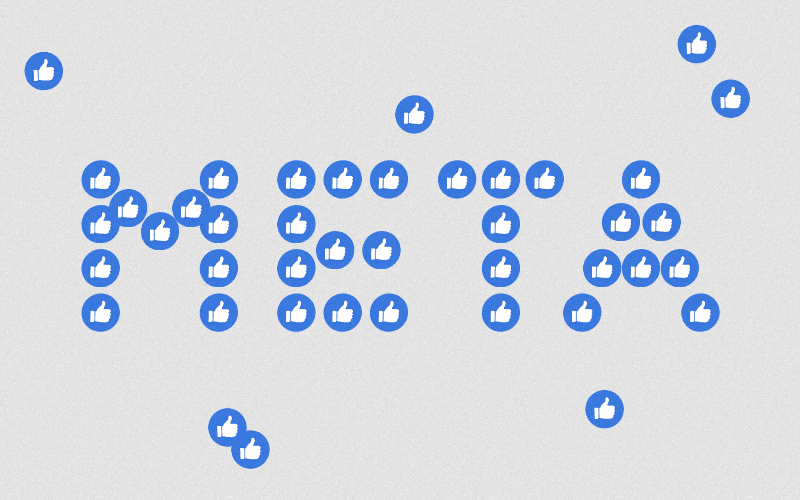Facebook rebrands parent company as Meta

Facebook has been in the media nonstop lately, and not necessarily for positive reasons.
The latest big news from the social media giant was last week’s announcement that the new name of their parent company would be Meta, a Greek word which founder Mark Zuckerberg says symbolizes “there is always more to build” and serves as a nod to a digital ecosystem called the metaverse that Facebook and its other endeavors (Instagram, WhatsApp, Messenger, Oculus) will all live within.
It’s important to note that this is just the name of the parent company to Facebook and its other brands, similar to Alphabet serving as the brand that owns Google, YouTube, Waze, Nest and others. So the familiar brands you interact with every day aren’t changing.
From the new logo itself, to the strategy surrounding this direction, to the rollout and timing of the move, to the implications for some of social media’s most popular apps, there is a lot to unpack here. So we tapped experts from around the agency to get their opinions.
BRAND STRATEGY
While only time (and, more importantly, earnings) will tell whether this rebrand benefits the company, it appears to be a wise move for several important reasons.
With regard to creating a more logical brand architecture, the move seems to make perfect sense. Relying on “Facebook” to double as the name of both the parent company as well as one of the sub-brands was confusingly asymmetrical. Creating a new brand for the parent company eliminates this issue, establishing clearer relationships between the parent and sub-brands, as well as between each sub-brand.
Brand hierarchy aside, however, there was also a clear reputational impetus for the move. Recent polling by Pew demonstrates a growing distrust of Facebook around several issues, from its delivery of political and election news to its monetization of user data. This increasing distaste for the platform is one reason Facebook is on pace to experience its slowest rate of growth ever in 2021, according to Business Insider. Some employees of the company believe the association with Facebook has actually damaged the reputations of its other platforms, referring to it as a “brand tax.” There is, of course, no guarantee that a fresh new parent brand will eliminate the negative impacts of the brand association, but removing “From Facebook” from Instagram’s footer is certainly a start.
—Dan Giacomini (Marketing Director)
CREATIVE
At first glance, the logomark is relatively generic. The same infinity loop can be found on countless other logos, and you can probably license your very own version from a number of creative marketplaces online.
I have to imagine the intent of the design was to be generic—with a keen eye on the big picture of the brand architecture. It will no doubt play a supporting role in the presentation of its hero brands—Instagram by Meta, WhatsApp by Meta, etc.—allowing them and their respective brand equity to be the focus. It will also likely be more effective in evoking a broader mission statement of services than the Facebook brand (limited by its familiarity) ever could.
The name works, although I don’t think it helps erase any of the negative context surrounding the Facebook brand these days. It might even reinforce their mishandling of information if you think of Meta in reference to metadata and their practice of exploiting everything their users post and do online.
The introduction of this brand has naturally elicited the ire and criticism of ALL the internet, which is why, in my opinion, the best thing about it are the memes it has inspired.
—Michael Tsanis (Senior Vice President, Creative Director)
PUBLIC RELATIONS
You don’t need to be a public relations expert to jump to the conclusion that the launch of the new brand was timed to distract, or pull attention away, from Facebook’s most recent rough stretch of damaging news.
However, the people who follow news close enough to know and care that Facebook’s parent company has a new brand identity are the same people who are savvy enough – or cynical enough – to see through the move as an attempt to distract from the company’s missteps. Most people will continue to use Facebook and its other brands as they already had.
Over time, the added distance from the Facebook brand may benefit the company’s other apps, but in the near term, the harmful effects of its negative headlines will continue to linger.
For our clients, who tend to be far less ubiquitous than Facebook, we often recommend two strategies to mitigate against the impact of crisis and restore trust and credibility after a crisis. The first is to build positive relationships with the media and trusted relationships with their customers, and the second is to “get back in the win column” by addressing the issue at the center of the crisis and turning their attention to making a positive impact for their customers and communities.
Building positive relationships happens over years through openness and transparency, access to executives, responsiveness, honesty, exclusive story opportunities, doing right by customers, and positively contributing to communities and society. You can assess how Facebook has done on these measures.
After the crisis happens, companies need to take steps to address the issue that created the situation, and they should communicate how they’re responding. Then, they should take action to make a positive impact. More than launching a new brand identity, companies need to invest in projects and programs that will uplift communities and improve people’s lives. That’s the purpose-driven way brands can restore relationships and repair perception in the weeks and months after a crisis.
—John Mackowiak (Vice President, Public Relations)
SOCIAL MEDIA
The shift to the overarching “Meta” brand allows their existing social platforms to stand on their own and will allow users to socialize, work, play, shop, and create across various apps without being tied to a Facebook account. We are seeing clear age and engagement gaps across all social networks, so having the company’s brand detached from any singular platform creates space to adapt, grow, and pivot when necessary.
Keeping some separation between the apps also prevents them from negatively affecting one another. We know about the very recent Facebook backlash but what about the negative claims surrounding Instagram and its impact on the self-esteem of teenagers and beauty standards around the world?
While the apps that fall under Meta’s umbrella will still provide the same functions as they do currently, Zuckerberg is pushing users to see them as a string of tools — separate but equally useful — that will provide a complete user experience within the “Metaverse,” until a new all-encompassing social platform is built which could take place over the next 10 years or so.
—Mary Kate O’Connor (Social Media and Content Manager)
DIGITAL MARKETING
Facebook is pushing the “Metaverse” because it best represents the current model of their business – diverse platforms that live in different mediums. Much of their vision for the “Metaverse” is highly aspirational, and in practice will not prove to be as engaging or popular as we assume. By casting a wide net, they can have a greater chance for success capturing and retaining key customer demographics and those will become more of the focal point over time.
—Levi Neuland (Senior Vice President, Digital Marketing)
